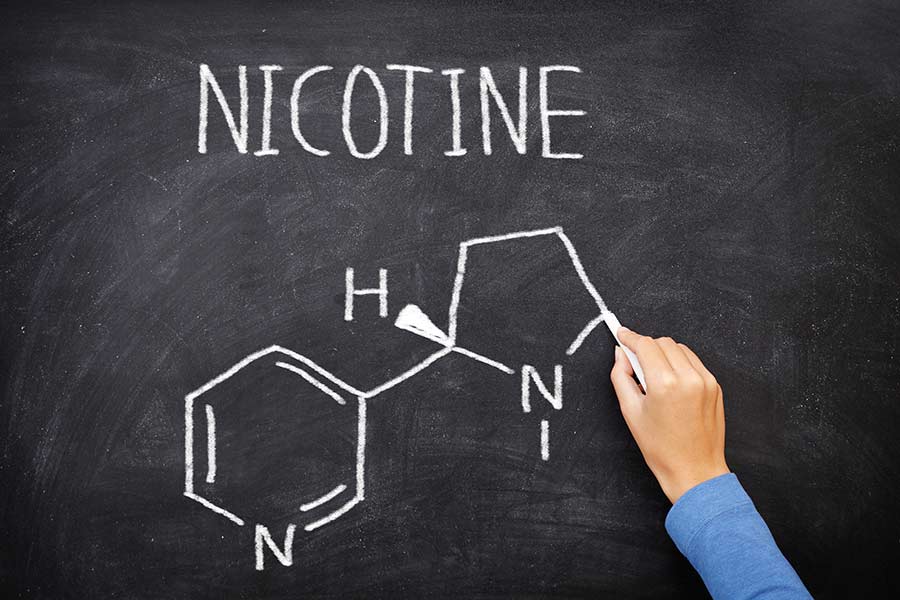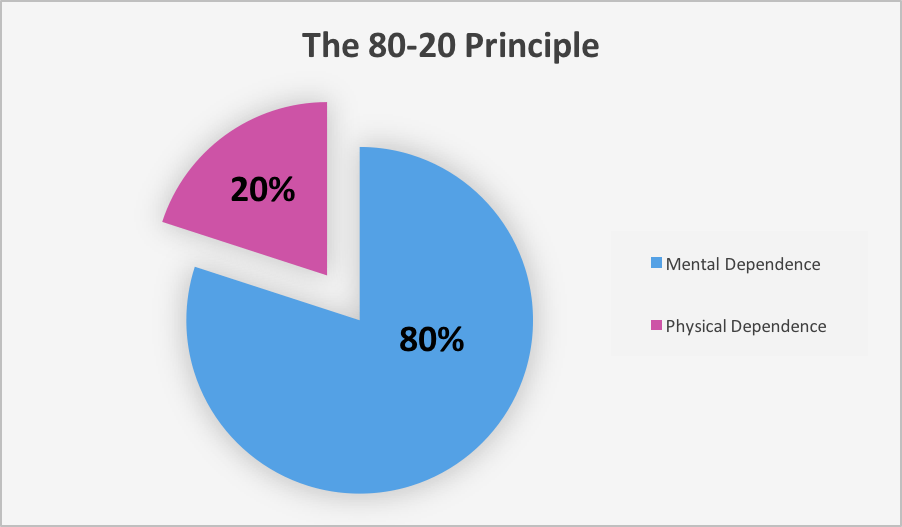You probably already know that the nicotine addiction is a harmful, expensive, hard-to-break habit.
You may even know what the signs of nicotine addiction are. And how smoking affects your body, health, and energy.
Yet despite your best efforts, you still can’t quit.
Why?
To know why you can’t stop smoking, you first need to know why you’re smoking.
So, “Why do you smoke?”
Knowing the real reason why you smoke, makes it a whole lot easier to tackle this reason and eventually quit.
What (most) People Believe about Nicotine Addiction
Most people believe that smoking is ONLY a physical addiction to nicotine.
Nicotine comes from the tobacco plant and it’s a pesticide. Even though nicotine is an addictive substance, nicotine addiction is not a strong physical addiction, because nicotine has a short half-life and it’s easily metabolized from the body. Nicotine starts leaving your body 30 to 45 minutes after you smoke a cigarette. That’s why you need to smoke regularly throughout the day.
So nicotine may be the reason you first got hooked to this habit, as a teenager maybe, but it’s not the reason why you kept on smoking for all those years.
When you first started smoking, you probably thought you would have quit by now. So why haven’t you?
Well, if nicotine addiction was the real reason…
Then why do ex-smokers relapse back to smoking even after the nicotine withdrawal is over and there is no nicotine inside their body?
3 to 5 days after smoking your last cigarette, your body expels most of the addictive substance (provided that you don’t use nicotine substitutes).
So what can cause someone to have a smoke 1 month or even 1 year after overcoming their nicotine addiction?
And why do most people give mental and emotional reasons for smoking…like I enjoy it, I need it, it relaxes me, it’s my friend or its habit?
When I ask our members: “Why do you smoke?”
…The answers I get, are a spin on this:
“I enjoy it.”
“I need it to relax.”
“I’m afraid of gaining weight.”
“I don’t know what to do when I’m bored.”
“I’m used to it; it’s a habit. Something to do with my hands.”
(You might have answered something similar when I asked you “Why do you smoke?” just a few lines ago.)
All these reasons are mental. Psychological. Emotional.
Not physical.
The Real Reason Why People Smoke
You see, smoking is not only a physical addiction but also a mental one.
Nicotine affects our body but above all, our mind.
To be precise, 80% of the smoking addiction, is made up of the mental dependence on smoking.
Simply put, the mental addiction is your desire for cigarettes.
It’s how much you believe you enjoy and need smoking, how ingrained it is in your life, and the benefits you think you get from it.
Benefits like relaxing from stress or anxiety, taking a mental break, managing your weight, or keeping your hand busy when you are bored, while driving, talking on the phone, or watching your favorite TV show.
And only 20% of smoking, is the physical addiction to nicotine– the substance that first hooked you to this habit.
Think about it. It’s not your body that craves a smoke every time you want to take a break.
It’s your mind that wants it. And your hands that feel empty.
Because your mind has linked certain triggers to smoking and it reminds you to smoke when you have those triggers.
And if you believe you’re too addicted to nicotine… then how do you sleep?
You may sleep 6, 7, or 8 hours without smoking. Your physical cravings for nicotine don’t wake you up.
If nicotine was the real problem, then your physical cravings would wake you up every one hour just to smoke.
But they don’t. Because they make up for only 20% of the tobacco addiction.
On the other hand, what happens if you go 8 straight hours during the day when you’re awake?
Well, that’s a different story, right?
All hell breaks loose. You have cravings, you feel agitated, you think about smoking all the time.
Why does this happen?
Because your mind is awake. And your mind reminds you to smoke when you get upset, stressed, or anxious. Or when you see other people smoking.
As you can see, the REAL reason you’re still smoking is your mental dependence on smoking: how smoking makes you feel and how much you believe you need it.
Why do you feel you need nicotine in the first place?
Because nicotine has hijacked the dopamine pathways in your brain and it makes your brain believe it needs nicotine to survive, the same way it needs food. Of course, you don’t need nicotine to survive because nicotine is poison.
So even if a part of you hates smoking, the way it makes you smell, the cost, how it harms your health, and all the worry and the guilt that comes with it… there is another part of you that is afraid not to smoke.
Because you’re used to smoking in many moments in your day and all these situations have been linked so closely with your smoking habit, that on some level you’re afraid that if you quit your cigarettes will magically take away with them your capacity to enjoy life and cope with your problems.
So what keeps you stuck, is fear.
Fear of change, fear of failure, fear of cravings, fear of the unknown, or the fear that you will turn into someone else. All this fear is caused by the mental addiction.
Do You Smoke Because You Enjoy It?
Sometimes people tell me “I smoke because I enjoy it.”
If you think you really enjoy smoking, let me ask you this:
If you could wake up tomorrow and never smoke again, no cravings, no memory of smoking, not miss it, not desire it, nothing – would you do it?
Most people would gladly take that opportunity.
And if you would also do it, it means that you don’t really enjoy smoking. Because if you really enjoy smoking then why stop? And if you really, really enjoy smoking, then why read quit smoking related articles like this one?
You do that because a part of you knows that you don’t want to be smoking. A part of you knows that smoking offers you nothing. But as long as you believe it does and as long as you believe that smoking adds some kind of value to your life you will keep craving cigarettes.
So basically what you see as enjoyment or love or friendship, in reality, it’s an abusive relationship based on lies and fear.
You smoke because you’re afraid of what will happen if you don’t. Because you think you can’t live without it.
But that’s an illusion, that’s a lie, that’s what addiction is.
Addiction makes us believe we can’t live without the thing we’re addicted to. But of course, you can.
The truth is that you will be better off as a non-smoker because smoking offers you nothing. What you do as a smoker you can do better as a non-smoker.
For example, your anxiety decreases when you stop smoking and this has been proven by research as well. Just think about it. Being addicted, worrying, having cravings, having health anxiety is a source of stress all by itself. All this goes away when you stop smoking.
Or you can concentrate better as a non-smoker because you don’t have your craving mind interrupting your train of thought all the time.
And you can cope with boredom better as a non-smoker.
If smoking was so entertaining that it relieved boredom then people would buy tickets to go watch other people smoke. Just stare at them, the same way they watch football or theatre. But people don’t do that because smoking is not taking away our boredom.
On the contrary, smoking causes boredom because it drains our energy to do things.
So to sum up:
Most people think they smoke because of the physical addiction to nicotine. But smoking is a mental and a physical addiction, and the reason why you smoke is the mental addiction. The real reason why you smoke is that you believe smoking offers you something and you worry about losing that. So you are going to quit easily and never miss it again when you realize that smoking offers you nothing at all.
The Only Way to Stop Smoking Successfully
The only way you can stop smoking successfully without any feelings of deprivation is as simple are removing the 80% of the smoking addiction – the mental addiction.
Then why only 6% of smokers quit successfully?
Simple.
Because most stop smoking methods and aids out there tackle only the physical part of the nicotine addiction: the nicotine dependence.
Which is only 20% of your addiction.
In that perspective, it makes a lot of sense that only 6% of smokers end up breaking free from smoking.
Here’s how:
Nicotine substitutes– gums, patches, lozenges, and vaping- feed your body with nicotine. So they’re simply giving you the momentary illusion, that you are satisfied without your cigarettes. Apart from that, some people end up with a dependence on nicotine substitutes such as nicotine gum addiction.
Plus, nicotine substitutes do not show you how to manage stress, boredom, and keep your hands busy without nicotine. That’s why smokers go back to smoking when they get stressed.
The same goes for smoking pills. These chemicals decrease your nicotine cravings. But they don’t show you how to feel good and enjoy life without nicotine.
That’s why many smokers relapse the moment they’re off the pills.
Not to mention all the side effects.
Now using willpower to resist smoking does not keep you addicted to nicotine. And that’s great.
But pure willpower can’t remove your desire for a cigarette either.
Instead, it makes you want to smoke more.
Because when you can’t smoke, the thought of a cigarette becomes even more precious. So you eventually smoke again. (I know I’ve been there in the past – more times than I would like to admit.)
Now does that mean that quitting is hard and that we are doomed to smoke forever?
Not at all.
It just means that we’ve been trying the wrong way.
The right way to quit, and the easiest one, is to remove the 80% of your addiction BEFORE you stop supplying your body with nicotine.
Here’s why:
When you’re no longer mentally dependent on smoking, you also no longer:
- experience stress, boredom, food cravings, or irritation when you don’t smoke.
- feel that “something is missing” when you don’t smoke after your meal, or with your coffee or when you’re driving.
- feel your hands empty without a smoke.
- get tempted to smoke if your husband, a colleague, or a stranger is smoking next to you.
Best thing, when cigarettes are out of your mind, then your nicotine withdrawal symptoms are hardly noticeable.
… so quitting becomes EASY.
That’s why in the CBQ method, you first stop wanting to smoke, and then you quit.
And you do that naturally, by changing how you think about smoking.
To learn more about how to quit smoking and overcome the mental dependence on cigarettes with the CBQ method, make sure you get the foundational video of the CBQ method.
It’s free, just enter your name and email address so I can send you the video.
Click here to get the foundational video of the CBQ method so you can beat the smoking addiction once and for all.



